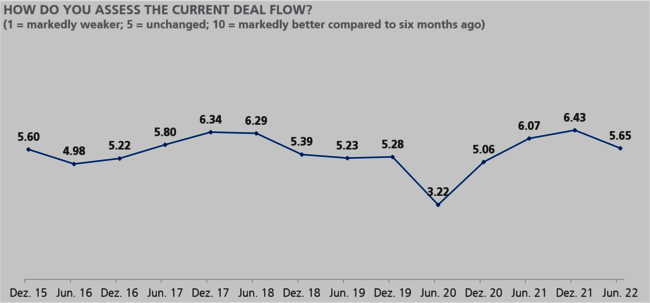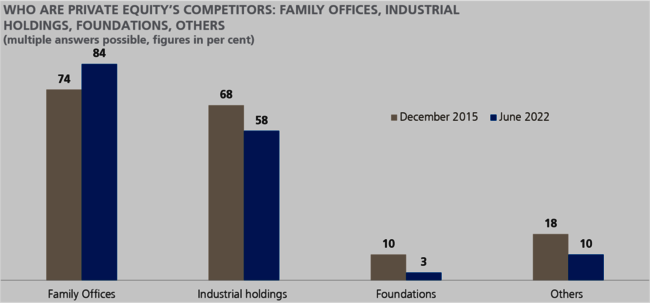“Private equity is so well-established that it remains attractive even under adverse conditions”
Sentiment on the M&A market has moved from “business as usual” to a cautionary stance; emergency brakes, however, have not been applied – this is what the results of the most recent Midmarket Private Equity Monitor survey conducted by industry magazine FINANCE suggest. The journal, in conjunction with Deutsche Beteiligungs AG (DBAG), regularly conducts an anonymous survey amongst investment managers working for mid-market private equity companies, asking about sentiment on the M&A market and other topics. A surprisingly low number – just six per cent – of managers questioned in the Midmarket Monitor are currently facing difficulties in buying or selling businesses; however, the survey was conducted in the second half of May and news flow, for example on inflation or economic prospects, has since deteriorated, thus putting the result into perspective.
“Private equity is so well-established in Germany that interesting investment opportunities exist even under adverse conditions,” explains Torsten Grede, Spokesman of the Board of Management at Deutsche Beteiligungs AG, adding for DBAG: “Our deal flow, especially the self-originated deal flow, remains satisfactory, even though the environment has obviously worsened. In addition to uncertainty caused by disruptions in the wake of the war, the turnaround in central bank interest rates is now making itself felt; as of yet it is unclear how hard banks will hit the brakes.”

On a scale from 1 to 10, the investment managers rate their current deal flow at 5.65, with 10 being a strong deal flow. As a reminder: the survey was conducted in the second half of May. Compared to the multiple-year average value of 5.47, this year’s result is thus above average; compared to the last two surveys in summer and winter 2021 however the result is weaker. In summer 2021, private equity investors rated the deal flow at 6.07, in winter 2021 even at 6.43, marking an all-time high. Catch-up effects, which were felt on the M&A market especially in the second half of 2021, should have largely petered out since the beginning of this year.
Competition remains fierce
Even though a high level of uncertainty prevails, some things have not changed. Market participants wishing to sell their portfolio companies are facing fierce competition on the M&A market. In this respect, financial investors are seeing the fiercest competition for attractive targets from their peers. The investment managers surveyed rated competition amongst private equity investors at 8.03 (on a scale ranging from 1 to 10, with 10 being high competitive pressure). Perceived competitive pressure for good assets in the private equity sector has been on high levels of above 8 now in four consecutive surveys. Strategic investors are playing an increasingly smaller role in (structured) M&A activities in the view of survey participants.
Comparing themselves to corporate investors, the private equity managers’ view on their own strength has continuously risen since the first survey in autumn 2015. On a scale from 1 to 10, the value in the current survey is 6.52, with 10 referring to clear superiority of private equity companies. That is the highest value achieved since the survey was launched in 2015.
Family offices – major competitors for private equity companies
A closer look at the realm of financial investors, however, paints a different picture: 84 per cent of respondents indicate that asset managers working for families of entrepreneurs constitute the fiercest competition for private equity. Never before have so many surveyed financial investors assessed family offices as serious competition.

Industrial holding companies follow with 58 per cent, whilst only three per cent of investment managers see foundations as major competitors. Meanwhile, ten per cent of surveyed financial investors see other financial investors such as pension funds as major competition.


 Newsletter
Newsletter
 Contact
Contact
 Downloads
Downloads







